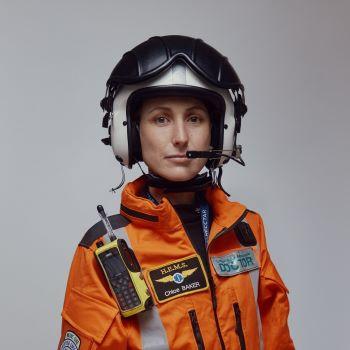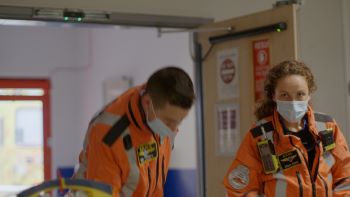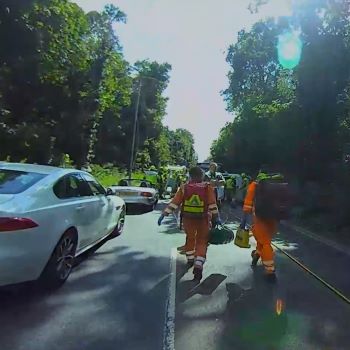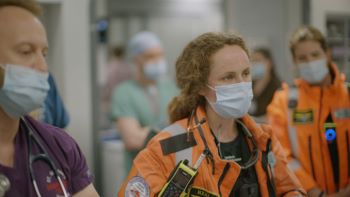8 Mar 2022

For International Woman’s Day 2022, we spoke to Dr Chloe Baker, one of London’s Air Ambulance registrars. Recently featured in Channel 4’s new documentary, “Emergency”, Chloe attends to London’s most critically injured patients on a daily basis; taking the hospital to the roadside when a life is on the line.
Not only is Chloe one of London’s Air Ambulance’s advanced trauma team, but also a former patient of the service, having had her life saved aged 21.
Below, Chloe gives us an insight into a day in her boots.
What’s involved in a typical day as a London’s Air Ambulance registrar, if such a thing exists?
On scene, my role includes examining the patient, gathering information and determining a plan with the paramedic, which we then communicate to the team. When necessary we perform immediate interventions, which can be sedation, anaesthesia, intubation or minor surgery.
When out as a three-person team, I am leading or assisting the consultant in charge of the job – we take it in turns to lead once the registrar is trained. At night we might operate as a two-person team: a registrar and a paramedic. In this case, the registrar role is to lead the job, as well as navigate the car at night.
The less glamorous aspects include all of the base admin: daily kit checks, daily car and helicopter checks, and a daily brief. We also organise a brief review of all the jobs from the preceding 24 hours.
Once all this is complete we aim to do some training – usually moulage. This is a low fidelity simulation with a mannequin, where we practice certain practical or decision-making skills, or explore challenging situations. All of this happens whilst on the base and can be interrupted at any moment by the klaxon sounding.
What motivated you to get into pre-hospital emergency medicine?
 I think I may have been motivated by the sense of relief and gratitude I felt to the men in orange who attended to me, when I was run over by a lorry whilst cycling, aged 21.
I think I may have been motivated by the sense of relief and gratitude I felt to the men in orange who attended to me, when I was run over by a lorry whilst cycling, aged 21.
Visually, I only remember their orange ankles, high vis stripes and heavy black boots, but I also remember the calmness and reassurance of their voices while they instructed the team. I wasn’t the only one there terrified I might die, it was quite clear all the bystanders, police and paramedics had the same thought. As a medical student I understood that I had time-critical injuries and needed to get to hospital urgently, but the scene seemed paralysed by this concern, until London’s Air Ambulance’s advanced trauma team turned up and took control. I still remember the relief I felt when they said they’d put me to sleep and take me to hospital.
What are the things you love most about your job?
I gain the most reward from helping the sickest patients in hospital: I’m currently an intensive care and anaesthetic trainee in the hospital. London’s Air Ambulance is even more focused on attending London’s most critically-injured people and bringing them to hospital for definitive treatment in the best state possible. For me there is no work that’s more rewarding.
The aspect I love most about pre-hospital work is the intimacy of the teamwork with our paramedic colleagues and the need to rapidly form effective teams with the wider emergency services on arrival at a job. It’s really satisfying to work with the London’s Air Ambulance paramedics, who we train so intensively with, to help get all members of the team performing at their best, to do the best possible job for the patient.
What are the biggest challenges you have to face in your job?
To be honest, the biggest challenge is probably the hours – in a busy week I will leave before my daughter is awake and come home long after she’s gone to bed. But that’s just working in healthcare to be honest!
How do you cope with the demands of your job – mentally, physically and emotionally?

The wider team at London’s Air Ambulance is paramount for coping mentally and emotionally with the job. There is lots of informal support on base, but we also have a formal review meeting twice a week where jobs are discussed if they present useful learning to the rest of the team, if they posed unusual challenges, if mistakes might have been made or if interesting solutions were found. All jobs that might have been distressing for the teams involved are brought to this meeting and it is vital to intellectually and emotionally digest the challenges we face.
Personally I really enjoy the physical demands of the job – the intimate relationship we have with all the kit we carry, the physical challenge of running to the helicopter, accessing the patient when we arrive on scene and extricating them to the ambulance – to me they’re some of the best bits of the job!
What do you hope viewers will learn about trauma care and take away from watching Emergency?
I hope viewers will take inspiration from two aspects of the show. Firstly, nearly every job we attend involves patients experiencing the worst day of their lives, often surrounded by strangers. It never fails to fill me with wonder, the acts of kindness almost invariably performed by strangers when terrible things happen to people out and about. Nearly every patient we attend will have bystanders helping them, often selflessly covered in blood, cradling them in the road or sacrificing pieces of their clothing or other personal effects to comfort or reassure the patient. It’s truly amazing and never fails to make me feel grateful and humbled.
Secondly, we’re really lucky at London’s Air Ambulance Charity to have Frank, our Patient Liaison Nurse, who follows and supports our patients and families throughout their recovery and rehabilitation. For me, this is an amazing source of inspiration. The window Frank provides to us, to see our patients fighting to survive against all odds, and then full-heartedly rebuilding their lives, often over months and years, is awe inspiring. I hope that this programme will show the public what ordinary people, when faced with awful challenges, can rise to achieve.
Do you have any advice for girls who want to get into medicine?

I think medicine is a really exciting place to work at the moment, because it’s a discipline where all individuals are increasingly encouraged to bring a balance of masculine and feminine qualities to their jobs, and work on personal attributes that allow them to look after their patients most effectively.
To flourish as a woman, you don’t have to pretend to be a man. Air ambulance clinicians historically have an alpha-male stereotype, but the current leadership couldn’t be further from that – the ability to listen, compromise, communicate, connect and be driven by compassion are essential for our work. Indeed, when I was a registrar with London’s Air Ambulance, female doctors were the majority!
If you weren’t in medicine, what do you think you’d be doing?
I’ve always been a bit surprised I ended up in medicine – I much prefer literature and politics to science. Either way, a passionate source of motivation for me is social justice, so I think I’d be a journalist or a campaigner if I wasn’t a doctor.

